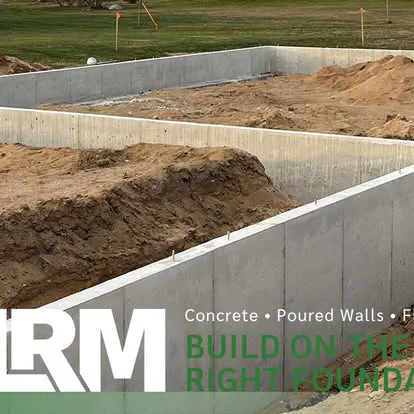
Poured vs. Block Foundations: Making the Right Choice for Your Home
- LRM Concrete Team
- Construction
- January 15, 2024
Table of Contents
When building a new home in Northern Michigan, one of the most crucial decisions is choosing the right foundation type. Let’s compare poured concrete and block foundations to help you make an informed decision.
Poured Concrete Foundations
Advantages
Superior Strength
- Monolithic structure with no joints
- Better resistance to lateral pressure
- Higher PSI rating than block
Water Resistance
- Fewer seams mean fewer leak points
- Better resistance to hydrostatic pressure
- Reduced risk of water infiltration
Installation Efficiency
- Faster installation process
- Fewer weather delays
- More uniform results
Considerations
- Requires experienced contractors
- Initial cost may be higher
- Weather-dependent pour conditions
Block Foundations
Advantages
Cost-Effective
- Generally lower initial cost
- Readily available materials
- Simple repair process
Construction Flexibility
- Can be built in stages
- Less weather-dependent
- Easier to modify
Considerations
- More seams and potential leak points
- Lower lateral pressure resistance
- Longer installation time
Climate Considerations
In Northern Michigan’s climate, consider:
- Freeze-thaw cycles
- Soil conditions
- Water table levels
- Snow load requirements
Our Recommendation
For Northern Michigan homes, we typically recommend poured concrete foundations because:
- Better handling of freeze-thaw cycles
- Superior moisture resistance
- Increased structural integrity
- Lower long-term maintenance
Cost Analysis
While initial costs may be higher for poured foundations, consider:
- Reduced maintenance costs
- Lower repair frequency
- Better long-term value
- Increased home resale value
Making Your Decision
Consider these factors:
- Budget constraints
- Site conditions
- Local climate
- Long-term plans
- Building codes
Contact us for a professional evaluation of your specific needs and site conditions. We’ll help you make the best choice for your new home’s foundation.